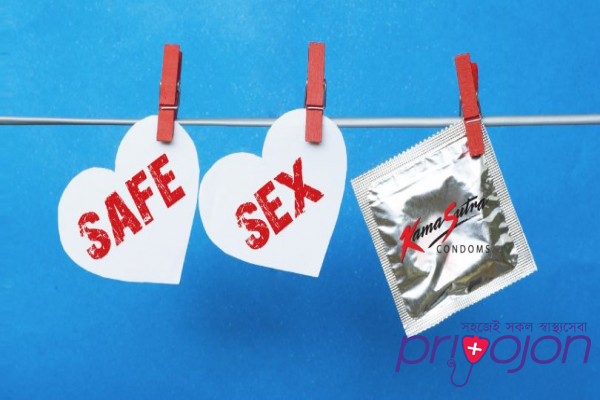Shared on 29-02-2020
Safe sex
Safe sex

Safe sex is having sexual contact while protecting yourself and your sexual partner against sexually transmissible infections (STIs) and unplanned pregnancy. Sexual contact that doesn’t involve the exchange of semen, vaginal fluids or blood between partners is considered to be safe sex.Unsafe sex may put you or your partner at risk of STIs such as chlamydia, gonorrhoea, syphilis, Mycoplasma genitalium, HIV or hepatitis B, or may result in an unplanned pregnancy.
Condoms and safe sex
Condoms offer the best available protection against STIs by acting as a physical barrier to prevent the exchange of semen, vaginal fluids or blood between partners. Safe sex is also called ‘safer sex’ to highlight the fact that condoms and other barrier methods are not 100 per cent effective in preventing STIs. However, condoms do offer the best available protection when used correctly.
For vaginal, anal and oral sex, you should use condoms. Points to keep in mind include:
- The male condom is a fine, strong, latex-rubber sheath available in a variety of sizes and styles. Condoms made from polyurethane are available for people allergic to latex.
- The female condom resembles a regular condom made of polyurethane, but is designed to fit inside the vagina. The female condom is pre-lubricated and is ‘one size fits all’.
- You should use other barrier methods – for example, condoms on vibrators and other penetrative sex toys, a latex glove for digital penetration of the vagina or anus, and a dental dam (a sheet of latex worn over the female genitals) during oral sex.
- Remember that a diaphragm (a cap worn high in the vagina to cover the cervix) offers good protection against pregnancy, but low protection against STIs.
- To be effective, condoms must be used from the start of sex to the very end as STIs can be transmitted via pre-ejaculate.
- Always use a new, lubricated condom every time you have sex. Check the use-by date and open the packet, being careful not to tear the condom with fingernails, jewellery or teeth.
- If you need extra lubricant, use only water-based lubricants. Other lubricants can damage the condom.
Effectiveness of condoms
Condoms, even when used correctly, don’t guarantee 100 per cent protection against STIs or unplanned pregnancy. Issues to consider include:
- Sex using a condom may still spread an infection if the condom does not fully cover the infected area. For example, some infections such as pubic lice, scabies, genital warts and herpes are spread by close skin-to-skin contact. Condoms provide some protection against these STIs, but not full protection as they do not cover the entire genital skin area.
- A condom may break, particularly if it has not been stored properly or the right lubricant has not been used. This is why you should always use water-based lubricant. Oil-based lubricants are associated with condom breakage and should not be used. Do not expose a condom to prolonged heat. Don’t use a condom that is past its use-by date. Don’t try to re-apply a used condom – they are designed for one use only.
Other tips for safer sex
Safer sex is also about having sex when you and your partner are ready, and having sex that’s enjoyable, respectful and protected. Ways that you can practise safer sex include:
- Having sex with only one partner, when neither of you has any STIs, is the safest way to have sex.
- Be STI free by getting tested for common infections and having treatment if necessary, especially if you have a new partner. Avoid sexual contact until the doctor or nurse tells you that you are no longer infectious and until both you and you partner have been treated.
- Communicate with your sexual partner about what you want and enjoy sexually.
- Be aware that drugs and alcohol may affect your ability to make good decisions. Protect yourself from having sex that you might regret or were pressured into because you weren’t thinking properly.
- Use other types of contraception in addition to a condom to avoid unplanned pregnancy.
High-risk or unsafe sexual activities
Unsafe sex outside of a monogamous relationship increases your risk of getting a STI. Examples of unsafe sexual activities include:
- having sex without a male or female condom
- withdrawing the penis before ejaculation instead of using condoms (pre-ejaculatory fluid may be infectious and can also contain sperm resulting in pregnancy)
- trying to re-use a condom or using a condom that is past its use-by date
- using a condom incorrectly or continuing to have sex once the condom is broken
- exchanging bodily fluids like menstrual blood, semen or vaginal fluids inside another person’s body (for example, mouth, vagina or anus).
What to do if you have unsafe sex
If you have had unsafe sex:
- avoid vaginal or rectal ‘douching’ (washing out or irrigating these areas with water or other fluids) as the irritation to delicate tissues could increase the risk of infection
- make sure you are not at risk of pregnancy. Consider taking the emergency contraceptive pill (within 72 hours is best, but it can be taken with 120 hours of unprotected sex or a broken condom if no other form of contraception was used)
- see your GP promptly to be tested for STIs
- consider post-exposure prophylaxis (PEP) to prevent HIV, if you are a man who has had unprotected anal intercourse with another man. Call the PEP line to assess whether you require post-exposure prophylaxis.
Safe sex is having sexual contact while protecting yourself and your sexual partner against sexually transmissible infections (STIs) and unplanned pregnancy. Sexual contact that doesn’t involve the exchange of semen, vaginal fluids or blood between partners is considered to be safe sex.Unsafe sex may put you or your partner at risk of STIs such as chlamydia, gonorrhoea, syphilis, Mycoplasma genitalium, HIV or hepatitis B, or may result in an unplanned pregnancy.
Condoms and safe sex
Condoms offer the best available protection against STIs by acting as a physical barrier to prevent the exchange of semen, vaginal fluids or blood between partners. Safe sex is also called ‘safer sex’ to highlight the fact that condoms and other barrier methods are not 100 per cent effective in preventing STIs. However, condoms do offer the best available protection when used correctly.
For vaginal, anal and oral sex, you should use condoms. Points to keep in mind include:
- The male condom is a fine, strong, latex-rubber sheath available in a variety of sizes and styles. Condoms made from polyurethane are available for people allergic to latex.
- The female condom resembles a regular condom made of polyurethane, but is designed to fit inside the vagina. The female condom is pre-lubricated and is ‘one size fits all’.
- You should use other barrier methods – for example, condoms on vibrators and other penetrative sex toys, a latex glove for digital penetration of the vagina or anus, and a dental dam (a sheet of latex worn over the female genitals) during oral sex.
- Remember that a diaphragm (a cap worn high in the vagina to cover the cervix) offers good protection against pregnancy, but low protection against STIs.
- To be effective, condoms must be used from the start of sex to the very end as STIs can be transmitted via pre-ejaculate.
- Always use a new, lubricated condom every time you have sex. Check the use-by date and open the packet, being careful not to tear the condom with fingernails, jewellery or teeth.
- If you need extra lubricant, use only water-based lubricants. Other lubricants can damage the condom.
Effectiveness of condoms
Condoms, even when used correctly, don’t guarantee 100 per cent protection against STIs or unplanned pregnancy. Issues to consider include:
- Sex using a condom may still spread an infection if the condom does not fully cover the infected area. For example, some infections such as pubic lice, scabies, genital warts and herpes are spread by close skin-to-skin contact. Condoms provide some protection against these STIs, but not full protection as they do not cover the entire genital skin area.
- A condom may break, particularly if it has not been stored properly or the right lubricant has not been used. This is why you should always use water-based lubricant. Oil-based lubricants are associated with condom breakage and should not be used. Do not expose a condom to prolonged heat. Don’t use a condom that is past its use-by date. Don’t try to re-apply a used condom – they are designed for one use only.
Other tips for safer sex
Safer sex is also about having sex when you and your partner are ready, and having sex that’s enjoyable, respectful and protected. Ways that you can practise safer sex include:
- Having sex with only one partner, when neither of you has any STIs, is the safest way to have sex.
- Be STI free by getting tested for common infections and having treatment if necessary, especially if you have a new partner. Avoid sexual contact until the doctor or nurse tells you that you are no longer infectious and until both you and you partner have been treated.
- Communicate with your sexual partner about what you want and enjoy sexually.
- Be aware that drugs and alcohol may affect your ability to make good decisions. Protect yourself from having sex that you might regret or were pressured into because you weren’t thinking properly.
- Use other types of contraception in addition to a condom to avoid unplanned pregnancy.
High-risk or unsafe sexual activities
Unsafe sex outside of a monogamous relationship increases your risk of getting a STI. Examples of unsafe sexual activities include:
- having sex without a male or female condom
- withdrawing the penis before ejaculation instead of using condoms (pre-ejaculatory fluid may be infectious and can also contain sperm resulting in pregnancy)
- trying to re-use a condom or using a condom that is past its use-by date
- using a condom incorrectly or continuing to have sex once the condom is broken
- exchanging bodily fluids like menstrual blood, semen or vaginal fluids inside another person’s body (for example, mouth, vagina or anus).
What to do if you have unsafe sex
If you have had unsafe sex:
- avoid vaginal or rectal ‘douching’ (washing out or irrigating these areas with water or other fluids) as the irritation to delicate tissues could increase the risk of infection
- make sure you are not at risk of pregnancy. Consider taking the emergency contraceptive pill (within 72 hours is best, but it can be taken with 120 hours of unprotected sex or a broken condom if no other form of contraception was used)
- see your GP promptly to be tested for STIs
- consider post-exposure prophylaxis (PEP) to prevent HIV, if you are a man who has had unprotected anal intercourse with another man. Call the PEP line to assess whether you require post-exposure prophylaxis.
Medically reviewed by
Dr. Rabeya Afroz Shomi
MBBS, FCPS, Dhaka Medical
3 Years of Experience
- Written by the Priyojon Editorial Team
